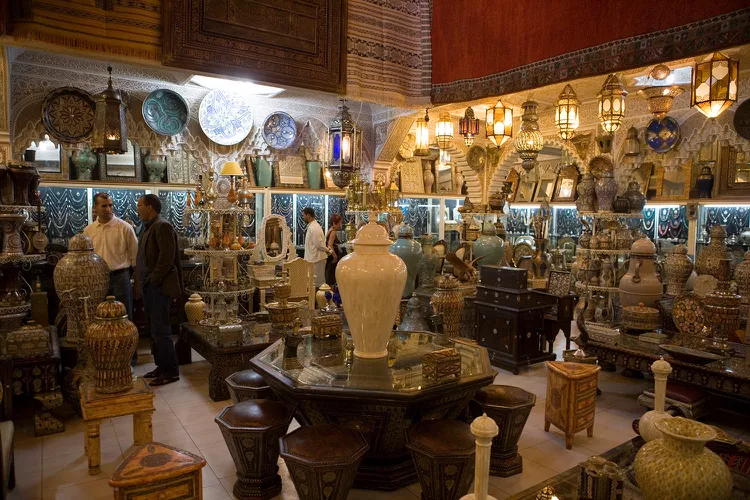Summary
- Learn a Few Catch Chinese Phrases
- Start at a Fraction of the Asking Price
- Practice a Little on Inexpensive Items
- Take Your Time
- Decide How Much You’re Willing to Spend
- Use the “Walk Away” Tactic
- Don’t Feel Sorry for the Seller
- Be Careful with Your Belongings
- Myth #1: Don’t Dress Up or Wear Jewelry
- Myth #2: Don’t Carry Large Bills
There’s a saying around here: “Everything in China is negotiable.” Shopping, buying, and selling are all part of an amiable bargaining game between the seller and buyer. Most of the time, it is friendly, but sometimes tempers can flare. Nonetheless, in the tourist trade, everyone is eager to make a deal; you just need to learn the rules of the game.
Learn a Few Catch Chinese Phrases
Nothing opens the door for you like a Ni hao ma? (How are you?) or a Duo shao qian? (How much?). There is no need to worry about diving headfirst into a complex conversation in Chinese. In most shopping situations, a large-format calculator will come out so that everyone can easily see the digits being discussed.
That said, transactions can even be wordless as you exchange the calculator with the seller. However, starting with some simple Mandarin phrases can ease you into the bargaining table and bring a smile to the vendor’s face. Consider reading about Chinese Phrases for Travelers to learn some essential phrases.
Start at a Fraction of the Asking Price
Determining how low to begin your bargaining depends on the items you’re shopping for. Typically, when shopping for inexpensive items, aim to start 25-50% lower than the asking price. For instance, a porcelain teacup may typically cost 50rmb; you can offer 15rmb and negotiate from there. For higher-priced items, consider beginning with around 10% of the asking price to allow for more flexibility. It’s crucial to start low to enhance your chances of securing a better deal.
Practice a Little on Inexpensive Items
Before you become too attached to an item, it’s wise to practice negotiating on smaller, less significant items first. Small inexpensive souvenirs such as teapots, fans, and chopsticks provide great opportunities to hone your bargaining skills and warm up before targeting higher-ticket items.
Take Your Time
Rushing is the enemy of good bargaining. The vendor possesses all the time they need to sell an item later, while you may have limited time before your departure. Consequently, take your time and avoid feeling pressured. If the seller isn’t coming down on the price you want, consider walking away and browsing other stalls. You might find a better deal elsewhere, which can aid in your negotiations with the original vendor.
Decide How Much You’re Willing to Spend on an Item
A simple tactic to avoid overspending is to set a mental limit for yourself as you consider an item. Therefore, as you pick up something, determine a price you’re willing to pay. This practice helps you remain focused during negotiations, and when a price surpasses your limit, it’s perfectly acceptable to walk away.
Use the “Walk Away” Tactic
In popular tourist spots, this tactic is often highly effective. After reaching a stalemate with the vendor and the price is still too high, make your final offer, then begin to walk away slowly while glancing at other items. This strategy often leads vendors to call you back with a better offer. However, there are times when you may not be called back, leading to the disappointment of possibly having to return at a higher price.
Don’t Feel Sorry for the Seller
Vendors often play the sympathy card during bargaining, claiming that your hard negotiations ruin their day. You’ll hear comments like “Now my child won’t have any dinner,” but rest assured, this is merely part of the game. Vendors typically make a profit, and they aren’t selling for the sake of kindness. It’s important to engage with them playfully; you could respond with humor, such as, “Yes, but now I can’t afford to have any dinner either!”
Be Careful with Your Belongings
Keep in mind that crowded markets can be hotspots for pickpockets. If possible, divide your cash into several locations (e.g., front pockets, money belt, wallet, purse). Additionally, avoid carrying your passport unless absolutely necessary.
Myth #1: Don’t Dress Up or Wear Jewelry While You’re Shopping
Some people advise leaving valuable jewelry at home while shopping in China. While this may seem prudent if you intend to flirt with shop attendants, it is generally unnecessary. Your foreign appearance is evident, so removing a diamond ring won’t convince a vendor that you’re an economically disadvantaged shopper searching for Ming furniture. Therefore, be yourself and engage in the bargaining game.
Myth #2: Don’t Carry Large Bills and Always Pay with Exact Change
Vendors do enjoy looking into your wallet to see how many large bills you may have, but it is unlikely that they will change their pricing just because they see you could easily pay more. Keep this in mind while shopping, as having larger notes can still work in your favor during negotiations.




